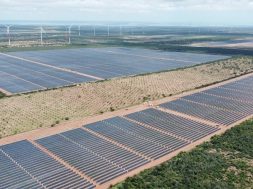
Solar power developers warned that projects could turn unviable as they can’t pass on additional levy on imported panels to distribution companies despite the central regulator allowing it.
Generation companies want to pass on the additional cost to consumers to offset the impact of 25 percent safeguard duty imposed by the government on July 30 to protect local manufacturing. While the Central Electricity Regulatory Commission allows a pass-through, developers said state-level regulators have still not asked distribution companies to do so.
A developer has to increase power tariff to set off the increase in cost due to the duty, said Shashi Shekhar, vice chairman at Acme Solar. “But utilities are not willing to buy power at a higher tariff.”
India imports roughly 90 percent of the solar panels from Malaysia and China, which had helped developers quote record-low tariffs. Higher costs now threaten Prime Minister Narendra Modi’s target of reaching 100 gigawatts of solar energy by 2022.
The Ministry of Power in August asked the power regulator to allow pass-through of higher costs due to any change in levies. The central regulator, however, is yet ask state regulators to allow that, Amit Gupta, director, legal and corporate affairs, at Vikram Solar, told BloombergQuint over the phone. Without states issuing directions to increase tariff, developers face a time-consuming and complex regulatory process to pass on additional costs under change in law in power purchase agreement, he said.
Already, 1,750 megawatts of solar bids out of 6,750 megawatts issued in 2017-18 have been scrapped so far, a company executive told BloombergQuint.
Future Unsure
The imposition of safeguard duty has delayed financial closure for solar projects. “Unless we get a certainty for a pass-through from the state governments, how will we approach banks for financing the project,” Shekhar said. “Therefore, developers are not participating in solar tenders.”
The Solar Energy Corporation of India had to scrap a 750 megawatts tender in Rajasthan after the utilities weren’t willing to agree for a tariff beyond Rs 2.44 per unit, Shekhar said, adding that two tenders were also cancelled because of a higher tariff in Gujarat.
Acme Solar approached the power regulator to seek a pass-through for Reva and Bhadla solar tenders. “We had filed the petition on Nov. 2 and are yet to get a date for a hearing,” said Shekhar.
The company won the contract for developing 200 megawatts at the Bhadla solar project at Rs 2.44 a unit and it has so far invested Rs 980 crore in setting up the plant, according to Shekhar.
Tariff Cap
The Ministry of New and Renewable Energy, according to reports by the Economic Times and Mint, asked the Solar Energy Corporation of India cap the tariff at Rs 2.5 and Rs 2.68 a unit for developers using locally made and imported solar panels, respectively. The higher cap was to factor in the impact of safeguard duty. The ministry reportedly arrived at the limits after the recent 2,000-megawatt NTPC Ltd. got bids for Rs 2.59-2.60 a unit, the Economic Times reported.
A ceiling of Rs 2.68 a unit is unviable, said Sunil Jain, the chief executive officer of Hero Future Energies. “Keeping in view factors like rupee depreciation, interest rates going up and safeguard duty, the impact on tariff is around 38-39 paise a unit,” he said. “A tariff below Rs 2.95 a unit is unviable for a developer.”
















